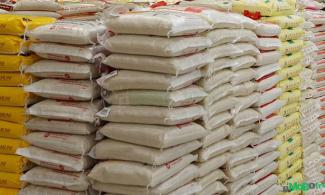
Mr. Lokpobiri said that Nigeria spends about $22 billion a year on importing food, and this number could swell if the price of rice increases.
The Minister of State for Agriculture and Rural Development, Senator Heineken Lokpobiri, has indicated that without a commensurable production capacity, the price of rice may rise to N40,000 per bag by December if Nigerians fail to engage in rice farming.
Mr. Lokpobiri said that Nigeria spends about $22 billion a year on importing food, and this number could swell if the price of rice increases. In order to reverse this trend, Nigeria needs to produce goods domestically rather than relying on imports, the senator emphasized.
The junior minister, who made this known on Saturday at a town hall meeting with stakeholders in Bayelsa State in Yenagoa, said there was a projection that by 2050, Nigeria's population would be 450 million. Such rapid population growth would exacerbate food insecurity, he said.
“The price of rice was N12,000 some months ago, but it is now about N26,000 and if we don't start producing by December, it could be N40,000,” Mr. Lokpobiri explained.
“Rice matures in three months. So this is a wake up call for Bayelsa people to take the four farms we have seriously. The average land you see in Bayelsa can grow rice, so the colonial masters were not wrong in their assessment when they said the Niger Delta could feed not only Nigeria but also the entire West Africa sub-region.
“Unfortunately, agriculture today is not a priority of the Niger Delta as far as the State governments are concerned because of oil,” he said.
He said the States in the Niger Delta have yet to give priority to agriculture the way the North-West States such as Kebbi, Jigawa, Kano as well as other States like Lagos, Ebonyi, Anambra, prioritize it.
Mr. Lokpobiri used Anambra State as an example of a State taking advantage of its agriculture. He explained that Anambra State’s vegetable exports have placed the State in a better economic situation than other States, despite not having any oil wealth.
The junior minister, who decried the destruction of the region's resources by militants, said agriculture was also one sure way of discouraging militancy.
“The only way we can take our people out of militancy is actually through agriculture, and this is also an opportunity to tell our people that the most important resources to any man is land and water resources.
"By the time you are blowing up pipelines, you are actually damaging the water resources. Today, people say it will take 20 years to clean up Ogoni and we are blowing up our pipelines. We are the people suffering from our own decisions, from our own wrong action. So, the time has come for change. Blowing up pipelines is not a way of drawing attention to constructive engagement,” Mr. Lokpobiri explained.
He said that there is no sector in the Nigerian economy that is as profitable as agriculture, adding that in Kebbi State, under the CBN anchored grower scheme, rice farmers were given a N7.5b loan and within three months, they made N69b and paid back their loans effortlessly.
Mr. Lokpobiri urged Bayelsans to key into agriculture to enable them to benefit from the various incentives from the Ministry of Agriculture.
The President of the Ijaw Youth Council Worldwide, Udengs Eradiri, said agriculture remained the sure way of addressing the security and economic challenges confronting Nigeria.
Mr. Eradiri said for the government to be able to woo people into agriculture, the farmers should be given adequate incentives, insisting that real farmers, not portfolio farmers, should be empowered with processing and storage facilities to give value to their produce.
He said agriculture is a potent tool to solve the Niger Delta crisis if the stakeholders and the government could come together and put proper mechanisms in place.
“Give the fishermen, for instance, the right incentive. We have a big problem in the Niger Delta. Agriculture is the sure way to solve the Niger Delta crisis. It is multidimensional. If the Ministry of Agriculture, with all the stakeholders, put their machinery together properly, we can use it to solve the Niger Delta crisis,” Mr. Eradiri said.
“The government should look at the project and give the financial support necessary so that the agricultural sector will have a lot of fertilizer from the oil and gas. And this will create a lot of jobs and these crises will be minimized.”
One obstacle confronting farmers in Nigeria is access to agricultural capital, according to Jonathan Omu, Chief Executive Officer of Achievers Farms Limited.
He said the promises by banks such as the Bank of the Industry and the Bank of Agriculture were not novel, saying that farmers in Bayelsa State had been receiving such promises without any action.
Mr. Omu added that even when the banks were giving out loans, they usually gave loans that were grossly inadequate, saying it was high time they started taking to court banks that refused to give loans to farmers.
